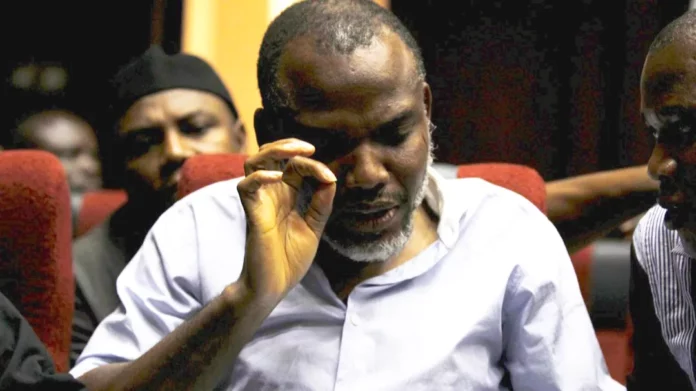The leader of the Indigenous People of Biafra (IPOB), Mazi Nnamdi Kanu, on Friday, recalled the trauma suffered by his late parents following a deadly military assault on their home in Afaraukwu, Abia State, in September 2017. The attack, part of the Nigerian Army’s Operation Python Dance, left his parents deeply traumatised, a trauma Kanu believes ultimately contributed to their deaths five years later.
In his emotional statement, Kanu reflected on the horrors that his parents endured after the military, in search of him, raided their home. “Five years ago today, I lost my precious parents,” Kanu said. He described the invasion as a “deadly assault” meant to kill him, which tragically led to the deaths of 30 innocent people, including his father, Eze Israel Okwu Kanu, and his mother, Lolo Ugoeze Sally Nmeme Okwu Kanu.
The IPOB leader’s recollections came during a regular meeting with his legal team at the Department of State Services (DSS) facility in Abuja. Kanu, who was able to escape the attack and flee to Europe, has often spoken about the traumatic impact of that day on both his family and the broader community.
In September 2017, Nigerian soldiers under Operation Python Dance launched a violent assault on the Kanu family’s home in Afaraukwu. The military action, allegedly aimed at apprehending Kanu, caused significant loss of life and destruction. Kanu’s father, a traditional ruler, and his mother both suffered severe psychological trauma during the attack. The traumatic experience, Kanu believes, contributed to their eventual death years later.
Kanu’s father, Eze Israel Okwu Kanu, was a respected traditional leader and royal figure. His mother, Lolo Ugoeze Sally Nmeme Okwu Kanu, was equally revered in their community. Despite their age, both of them witnessed the terrifying military assault that left the home riddled with destruction. Kanu’s statement highlights the lasting effect the event had on his parents, who could not recover from the psychological and emotional wounds inflicted by the military’s actions.
Kanu’s family members and supporters have long maintained that the attack was not just about the IPOB leader but was part of a broader campaign by the Nigerian government to silence the movement and suppress calls for Biafran independence. The military’s violent approach in the region has been widely condemned by human rights organisations, and the incident in Afaraukwu has become one of the most significant examples of what Kanu’s supporters call the brutal treatment of the Igbo people.
Nnamdi Kanu’s statement made clear the gravity of the tragedy that befell his family and the community in Afaraukwu. “In the attack, 28 innocent souls were killed,” Kanu’s legal counsel, Aloy Ejimakor, stated in the press release. The assault not only took the lives of his parents but also resulted in a broader massacre, where several other unarmed civilians lost their lives in the brutal military offensive.
Kanu’s legal team has consistently pointed out that the attack on his family’s home was not an isolated event. They argue that it was part of a pattern of violence against IPOB members and their supporters, aimed at curbing the movement’s calls for Biafra’s independence. In his statement, Kanu highlighted that those responsible for the deaths of his parents and others involved in the attack have not been held accountable.
“These murderers, and their accomplices in Igboland who ordered this heinous, cold-blooded massacre, are still walking free today,” Kanu lamented. His words reflect the deep sense of injustice that many feel, not only over the loss of his parents but over the lack of accountability for the violence that has occurred.
Following the attack, the Nigerian government quickly labelled IPOB as a terrorist group, a designation that has been fiercely contested by Kanu and his supporters. Kanu has repeatedly stated that the government’s decision to brand IPOB a terrorist organisation was a deliberate attempt to cover up the violence committed by the military. He has also argued that the government used this label to further vilify his movement and mislead the public about its true aims.
“The best tribute is to never forget what happened to them and all who fell in defence of freedom at our home,” Kanu said in his statement.
Kanu’s accusations against the Nigerian government reflect his ongoing battle against what he views as unjust treatment by the state. He continues to argue that his right to peacefully campaign for Biafra’s self-determination is guaranteed by Nigerian law, and that the government’s refusal to allow such expressions of freedom is both illegal and immoral.
.
Kanu’s parents, who passed away within five years of the 2017 attack, are remembered by many of their supporters as martyrs who endured immense suffering in the defence of their son and his political beliefs. For IPOB supporters, their deaths are seen as part of a larger narrative of injustice, where the voices of those advocating for Biafran independence have been suppressed through violence and intimidation.
In his statement, Kanu was not only grieving the loss of his parents but also lamenting the broader suffering of the Igbo people, whom he believes continue to face oppression from the Nigerian state. His call for justice and accountability continues to resonate among many Nigerians, particularly in the South East, where IPOB has a significant following.
Currently, Nnamdi Kanu remains in the custody of the Nigerian government, facing charges of treason, terrorism, and incitement to violence. His legal team is continuing to fight for his release, arguing that his detention is politically motivated and a violation of his rights.
Aloy Ejimakor, Kanu’s lead counsel, reaffirmed in the press statement that the IPOB leader is committed to seeking justice for the deaths of his parents and the many others who were killed in the 2017 assault. Ejimakor also noted that the fight for Biafran self-determination, as well as the pursuit of accountability for the violence against Kanu and his supporters, will continue.

